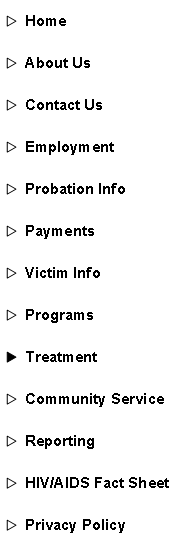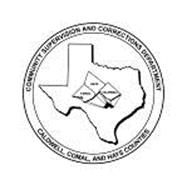

|
Community Supervision and Corrections Department |
|
Serving the Courts and Communities of Caldwell, Comal and Hays Counties |
|
Treatment |
|
Community Based Rehabilitative Services:
Out Reach Screening Assessment Referral (OSAR) Regions 7 and 8 of the Texas Department of State Health Services provide services within the Jurisdiction of the CSCD.
Description of OSAR Services:
OSAR is a free program funded by the Texas Department of State and Health Services that provides: Confidential alcohol and drug screenings, and assessments; Referrals for state-funded inpatient and outpatient drug and alcohol treatment; Brief interventions, which include motivational counseling; Education and support; Case management for clients who need assistance in accessing supportive services.
Who is Eligible for OSAR Services?
All Texas residents who are seeking substance abuse services and information may qualify. You may call the Statewide Hotline at Information at 211, or (877) 541-7905 24-hours a day, 7 days per week, for information regarding access to services.
You may also access information about OSAR at http://www.dshs.state.tx.us/sa/OSAR What to Expect During the OSAR Intake Process?
Once an appointment is scheduled you will come in and meet with a counselor who will complete a drug and alcohol assessment. The appointment can last 30 minutes to two hours depending on your individual need.
Region 7 (Includes Caldwell and Hays Counties) Bluebonnet Trails Community Services 1009 North Georgetown Street Round Rock, Texas 78664 Crisis Phone: 800-841-1255 OSAR Phone: 1-844-309-6385 http://www.bbtrails.org (website)
OSAR Region 8 (includes Comal County) The Center for Health Care Services 601 N. Frio, Bldg. II-Entrance C San Antonio, Texas 78207 Crisis Phone: 800-316-9241 or 210-223-7233
Residential Sentencing Alternatives
The decision to select a residential sentencing option is based on the assessed risk and needs of the offender. A variety of local and state residential facilities can be used to address an offender’s criminogenic risk and needs.
Contract Residential Services: When an offender needs treatment for a substance use disorder, this Department utilizes funds provided by the Texas Department of Criminal Justice – Community Justice Assistance Division to place offenders in specific treatment centers. Placement is limited to available funds.
Community Correctional Facilities (CCF):
The term Community Corrections Facility (CCF) describes a residential facility operated by a Community Supervision and Corrections Department. CCFs provide a secure environment and treatment targeting specific types of offenders. These are not secure facilities; failure to report as instructed or Unauthorized Absence from a court residential treatment center is a state jail felony offense. Below are descriptions of CCFs.
Court Residential Treatment Centers (CRTCs): CRTCs provide offenders with substance abuse treatment and educational, vocational, and life skills training. Many CRTCs include employment during the final phase of the program. Some facilities also provide treatment and services for offenders with mental deficiencies or emotional/family problems.
Substance Abuse Treatment Facilities (SATFs): SATFs are designed specifically to provide cognitive-based substance abuse treatment. SATFs may also include educational, life skills, and supportive Mutual Support Group orientation or modified therapeutic community treatment programs.
Intermediate Sanction Facilities (ISFs): CSCD-operated ISFs are used as intermediate sanctions for supervision violators in an effort to give the courts an incapacitation custody option other than revocation or incarceration. Programming provided in ISFs usually includes a substance abuse component, education, and cognitive and life skills programs; some CSCD-operated ISFs have an employment component. These programs should not be confused with the state-contracted ISFs.
Dually Diagnosed Residential Facilities (DDRFs): DDRFs provide the courts with a sentencing alternative for offenders with demonstrated/documented mental health issues. Most of these programs address offenders with co-occurring disorders of mental health and substance abuse. Programming in the DDRF includes a broad range of mental health, substance abuse, and life skills services for offenders with mental impairments in a residential setting.
State Contracted Intermediate Sanction (SC-ISF) State-contracted ISFs (SC-ISFs) are secure lockdown facilities that completely remove the offender from the community and provide either substance abuse treatment or cognitive treatment to medium- or high-risk felony offenders. The Texas Department of Criminal Justice (TDCJ) operates these facilities as an alternative to incarceration for medium and high-risk felony probationers in violation of the conditions of supervision, sanctioned at sentencing based on the nature of the offense or criminal history. These SC-ISF beds are available statewide to all CSCDs. The contractors operating the SC-ISF provide transportation service to and from the SC-ISF.
SC-ISFs have three treatment tracks: 1. Substance Abuse Treatment Track Cognitive-based 90-day program 2. Substance Abuse Relapse Track Cognitive-based 45-day program 3. Cognitive Intervention Track Thinking for a Change 90-day program For offenders who need both cognitive restructuring and social skills interventions
Substance Abuse Felony Punishment Facility (SAFPF) SAFPFs are substance abuse treatment facilities specifically designed for felony offenders (other than sex offenders) assessed as having a substance abuse problem. The typical SAFPF offender usually has a history of repeated substance abuse intervention failures at lower levels on the continuum of treatment, placed on community supervision for a Title V offense or cannot be treated in less secure environments due to a history of absconding or bail jumping. SAFPF is an intensive four level substance abuse treatment program that includes: · six to nine months at the SAFPF, · three months in a transitional treatment center, · nine to twelve months of outpatient aftercare treatment, and · a three to six-month SAFPF relapse component that can be utilized at any level after completion of SAFPF to address relapse behaviors
This Department employs specialized supervision offices who coordinate placement in the SAFPF continuum.
Alcoholics Anonymous/ Narcotics Anonymous Meeting Information:
Often, probationers are referred to attend mutual support groups. Alcoholics Anonymous and Narcotics Anonymous are examples of mutual support groups. This requirement may be a Court order, a requirement of a Court ordered program, a referral by the supervising officer, or as a result of a violation of supervision related to the use of alcohol and/or illicit substances. Below is information about these programs:
Information about meetings may be found posted in area newspapers in the classifieds, listed in area phone books, and online. Below are a few links to search for area meetings. Meetings times change from time to time to meet the needs of the group and its members. Please call a local meeting group or check online when searching for a meeting. AA Information: http://www.aa.org/ https://www.aa.org/pages/es_ES (Spanish) http://www.area68district2.org/
NA Information: http://www.na.org https://www.aa.org/pages/es_ES (Spanish)
|

|
Courthouse Photos by Larry D. Moore, used under a Creative Commons ShareAlike License |

